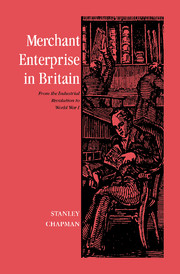Book contents
- Frontmatter
- Contents
- List of figures
- List of tables
- Preface
- Abbreviations used in the footnotes
- Introduction: approaches and concepts
- Part I The setting
- Part II New Streams Of Enterprise
- Part III Response to instant communication
- Chapter 7 Problems of restructuring mercantile enterprise
- Chapter 8 British-based investment groups before 1914
- Chapter 9 Imperialism and British trade
- Part IV Conclusions
- Manuscript sources
- Index of firms and people
- Index of places
- Index of subjects
Chapter 7 - Problems of restructuring mercantile enterprise
Published online by Cambridge University Press: 20 March 2010
- Frontmatter
- Contents
- List of figures
- List of tables
- Preface
- Abbreviations used in the footnotes
- Introduction: approaches and concepts
- Part I The setting
- Part II New Streams Of Enterprise
- Part III Response to instant communication
- Chapter 7 Problems of restructuring mercantile enterprise
- Chapter 8 British-based investment groups before 1914
- Chapter 9 Imperialism and British trade
- Part IV Conclusions
- Manuscript sources
- Index of firms and people
- Index of places
- Index of subjects
Summary
During the course of the nineteenth century, communications improved at an increasing pace, better roads, river navigation, canals, harbours, docks, and sailing ships being overtaken by the impact of the railways, steamships and the great international ship canals. The consequences were obviously far reaching for trade and merchant organisation, but change could be accommodated within the existing family business. The advent of the telegraph was quite another matter. It represented instant communication worldwide, and its effects were sometimes revolutionary. In principle there was now nothing to prevent direct communication between the manufacturer and his most distant customers, and the traditional chains of middlemen began to look redundant. The opening of the international telegraph lines broadly coincided with the intensification of competition in overseas markets from a rapidly industrialising Germany and the United States, and consequent pressure on mercantile profit margins. The last quarter of the nineteenth century was therefore a period in which British merchants were forced to rethink their strategies and to conduct very different kinds of business to those undertaken by their forebears in trade, or to withdraw into other activities.
The Textile Trade
Though the telegraph is familiar enough to historians, its economic implications have never been fully explored, and there is no major study to fall back on to measure its impact. The full implications are evidently too large to embrace in this book, but it will be helpful to identify some direct consequences of instant communication for merchant enterprise.
- Type
- Chapter
- Information
- Merchant Enterprise in BritainFrom the Industrial Revolution to World War I, pp. 193 - 230Publisher: Cambridge University PressPrint publication year: 1992



